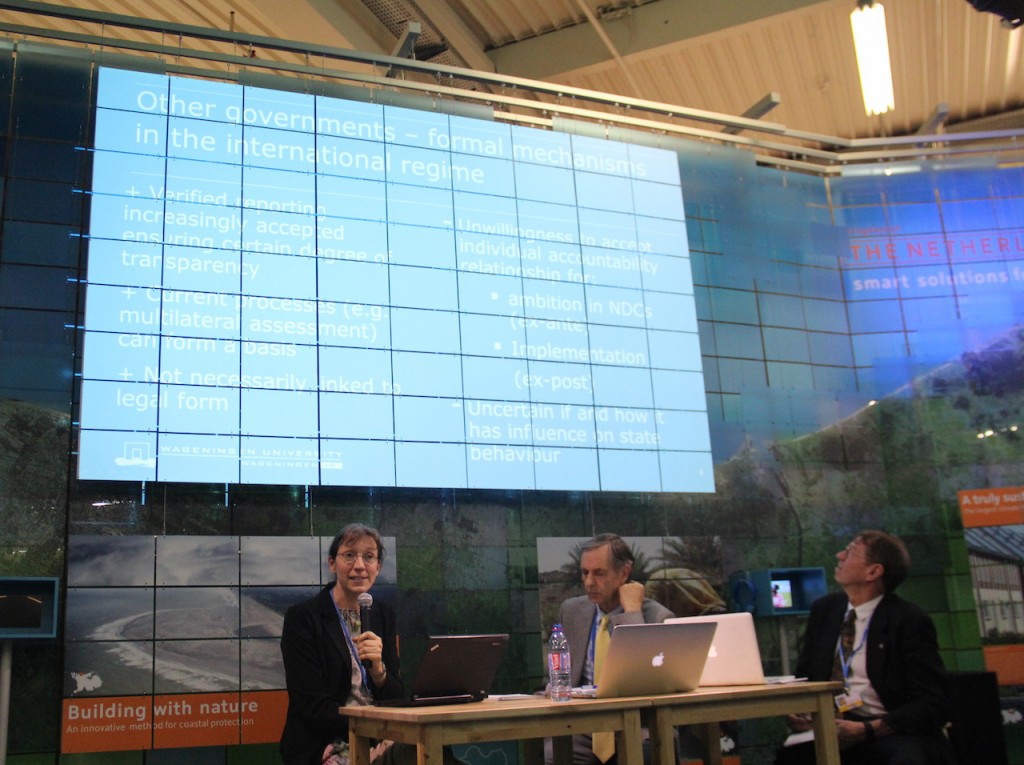A day of conversations, waiting and late reading at COP21
It is 21.00. The Committee of Paris is about to start. This is COP President Fabius’ construction for the second week of negotiations. At least once per day all delegates are gathered in the big plenary and observers are welcomed in the room (and on webcast mind you). The purpose is to update everyone on where the negotiations are – allowing comments from countries. This time all we expect is the delivery of a new version of the negotiation text. All night they negotiated, until 5 and 8 in the morning I am told. All day observers have been left to their own devices to keep busy – attending or organising side-events. The event I organised at the Netherlands Climate Pavilion was yesterday – a rich discussion about accountability of states after Paris with both a seasoned negotiator and parliamentarian serving as commentators and injecting experiences from the field. For example, sharing a parliamentarian’s fruitless effort to encourage early, inclusive and science based process of developing his country’s Intended Nationally Determined Contributions. And today I could share reflections on alternative ethical principles for accountability in an event at the Generation Space, the civil society arena open to the public built up next door to the COP. Also here an engaged audience providing this time eliciting an invigorating discussion among the panellists around how to reimagine accountability and on whether accountability and sovereignty of states are compatible concepts. Afterwards I took a few minutes to at least get some glimpses of the fantastic creativity of climate action displayed within those halls. What about a juice bar where the customers have to provide the energy for the juice machine by biking? Talk about multiple health benefits. Something for the new WUR plaza?
I then headed over to the COP again where there were some rumours the new text was on its way. And soon rumours turned to information on the screens – the meeting of the Paris Committee scheduled for 21.00. Ok. Three hours to go for dinner and catching up on email and writing up reports on side-events– but the first email announced the availability of 20 tickets for members of the RINGO constituency (Research and Independent NGOs), for a first come first served basis at 18.00. And of course – it is at the other end of the COP – some three football fields away (or that is at least how a friend referred to the distance). I rush off because it is after all nice to be in the room of action – compared to sitting just watching a screen. Arrived 18.05 and got the last ticket. Pfff. So some emails and food later at 21.05 (I have never attended climate negotiations with such punctuality) COP President Fabius takes the floor and describes the process through which they developed a new draft. From my notes (which should not be taken as perfect transcripts – check webcast for his statement) he said, among other things: “I invite you to look at the new version with our final agreement in mind. We have all been aware that compromise does require us to forget the ideal solution so we can get what is desirable. We have to show the necessary responsibility to find in the coming hours common ground”. Then he proposes the mode of work for the night – an ‘Indaba of Indaba of solutions’ meaning a meeting with heads of negotiators of all countries under Fabius’ chairing that will start working at 23.30. Fabius stresses that in this meeting “only compromise solutions should be presented, seeking landing zones. If there is difficulties on a point I will invite facilitators to meet in the corner with heads of delegations interested with aim of coming back to the meeting with a solution…I hope this allow us to meet requirement for results by heads of states…The world is waiting for a universal, legally binding, fair, ambitious, and enduring outcome”. He asks delegates if there are any comments on the proposed mode of work. Silence. The silence is a remarkable expression of support for the French Presidency. The gavel goes and then people starts rushing out – towards the document centre where the new text is handed out in the hundreds, thousands. I grab a copy and set off to the bus. I do not envy the negotiators who have another long night ahead of them. I pass the long line to the booth for meeting room requests. Groups of countries plan for their strategy meetings on the hours ahead. In the bus I start reading the paragraphs that I follow more closely; 11 on compliance – clean except for one bracket – whether it is about compliance indeed and not implementation. Paragraph 10 on global stocktaking. Clean. First one in 2023 and then every five years. Then my neighbour in the bus puts on his reading glasses and clearly wants to read the text also. So we flip through the pages – amazed at how much is agreed – although certainly the toughest questions are left on differentiation, ambition and finance. I check twitter to see if the seasoned NGO observers have started putting their observations online – no internet in the train. Ok. That will have to wait for when I get to the apartment. Instead I finish this blog.
Sylvia Karlsson-Vinkhuyzen Thursday 10 December at 22.40


